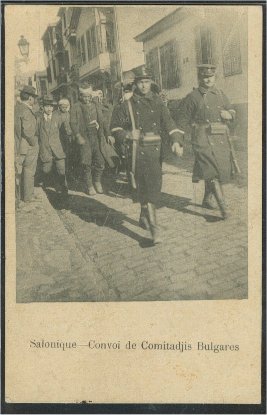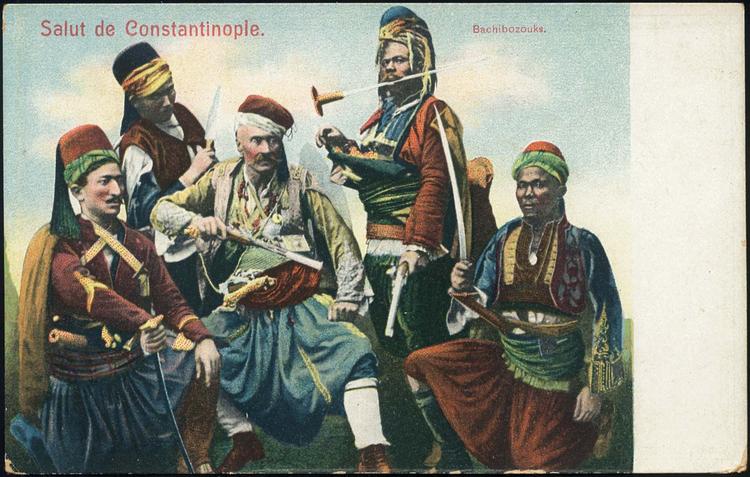|
Jelena Šaulić
Jelena Šaulić (1896 – 21 March 1921) was a Serbian teacher, participant in the Toplica Uprising, and a Komitadji during World War I. Early years and education Jelena Šaulić was born in Junča do near Žabljak, in 1896. She was the youngest of five children in the family of Perko Šaulić, a priest. In record-breaking short time before World War I, she graduated from the school of teacher instruction, and received her appointment as a teacher in Prizren. Career In February 1917, Bulgarian forces killed her mother and four days, later the Toplica Uprising started. Šaulić joined the rebels with her father. After the failure of the uprising, she crossed over to Montenegro with her father and the rest of the rebels. There, they joined the group of irregular military, led by Duke Boško Bojović. Šaulić was feared not only by the occupying forces but also by the irregulars who had joined only to loot, whom she mercilessly punished. After the war, she married her war companio ... [...More Info...] [...Related Items...] OR: [Wikipedia] [Google] [Baidu] |
Toplica Uprising
The Toplica Uprising () was a mass uprising by Serbian rebels against the Bulgarian occupation forces that took place in Bulgarian-occupied Serbia during the First World War. The rebels were motivated by grievances against the Bulgarian authorities for ordering conscription of local Serbs in the Bulgarian army, forced labor and the denationalization policy imposed on the indigenous population. The revolt was supported by Serbian guerrilla fighters known as Chetniks. The uprising lasted from 21 February to 25 March 1917. It was the only uprising in an occupied country during the entire First World War. Background In October 1915, the Kingdom of Serbia, which had throughout the fall of 1914 managed to withstand and repel three Austro-Hungarian invasions, found itself under attack again. This time it was a joint Austro-Hungarian, German, and Bulgarian invasion from two directions that included Austro-Hungarian Third Army, German Eleventh Army, and Bulgarian First and Secon ... [...More Info...] [...Related Items...] OR: [Wikipedia] [Google] [Baidu] |
Komitadji
Komitadji, Comitadji, or Komita (plural: Komitadjis, Comitadjis, or Komitas) ( Bulgarian, Macedonian and , , , , pl. , , ) was a collective name for members of various rebel bands ( chetas) operating in the Balkans during the final period of the Ottoman Empire. The name itself originates from Turkish and translates as "committee members". Komitadjis fought against the Turkish authorities and were supported by the governments of the neighbouring states, especially Bulgaria. Komitadji was used to describe the members of the Bulgarian Revolutionary Central Committee during the April Uprising of 1876, and Bulgarian bands during the following Russo-Turkish War. The term is often employed to refer later to groups of rebels associated with the Bulgarian Macedonian-Adrianople Revolutionary Committees and the Supreme Macedonian-Adrianople Committee called by the Turks simply the ''Bulgarian Committees''. In interwar Greece and Yugoslavia, the term was used to refer to bands organize ... [...More Info...] [...Related Items...] OR: [Wikipedia] [Google] [Baidu] |
World War I
World War I or the First World War (28 July 1914 – 11 November 1918), also known as the Great War, was a World war, global conflict between two coalitions: the Allies of World War I, Allies (or Entente) and the Central Powers. Fighting took place mainly in European theatre of World War I, Europe and the Middle Eastern theatre of World War I, Middle East, as well as in parts of African theatre of World War I, Africa and the Asian and Pacific theatre of World War I, Asia-Pacific, and in Europe was characterised by trench warfare; the widespread use of Artillery of World War I, artillery, machine guns, and Chemical weapons in World War I, chemical weapons (gas); and the introductions of Tanks in World War I, tanks and Aviation in World War I, aircraft. World War I was one of the List of wars by death toll, deadliest conflicts in history, resulting in an estimated World War I casualties, 10 million military dead and more than 20 million wounded, plus some 10 million civilian de ... [...More Info...] [...Related Items...] OR: [Wikipedia] [Google] [Baidu] |
Žabljak
Žabljak (Cyrillic script, Cyrillic: Жабљак, ) is a small town in Montenegro in the Northern Montenegro, northern region. It has a population of 1,723. Žabljak is the seat of Žabljak Municipality (2011 population: 3,569). The town is in the centre of the Durmitor mountain region and with an altitude of 1,456 metres, it is the highest situated Balkan town. History The first Slavs, Slavic name of the place was ''Varezina voda'' (Варезина вода) possibly because of the strong source of drinkable water nearby, making a settlement possible. Later, the town was renamed ''Hanovi'' because it was where caravans rested. The modern name dates from 1870, when in a single day the building of a school, church and captain's home began. However, almost all the original buildings were destroyed during the Balkan Wars. All that has remained is the old church of Sv. Preobraženje (Holy Transfiguration), built in 1862 as a monument to a Montenegrin victory in the battle ag ... [...More Info...] [...Related Items...] OR: [Wikipedia] [Google] [Baidu] |
Prizren
Prizren ( sq-definite, Prizreni, ; sr-cyr, Призрен) is the second List of cities and towns in Kosovo, most populous city and Municipalities of Kosovo, municipality of Kosovo and seat of the eponymous municipality and District of Prizren, district. It is located on the banks of the Prizren Bistrica, Prizren River between the foothills of the Sharr Mountains in southern Kosovo. Prizren experiences a continental climate with some mediterranean climate, mediterranean influences. Prizren is constitutionally designated as the historical capital of the country. Archaeological excavations in Prizren Fortress indicate that its fortress area has seen habitation and use since the Bronze Age. Prizren has been traditionally identified with the settlement of Theranda in Roman Dardania (Roman province), Dardania, although other locations have been suggested in recent research. In late antiquity it was part of the defensive fortification system in western Dardania and the fort was recons ... [...More Info...] [...Related Items...] OR: [Wikipedia] [Google] [Baidu] |
Irregular Military
Irregular military is any military component distinct from a country's regular armed forces, representing non-standard militant elements outside of conventional governmental backing. Irregular elements can consist of militias, private armies, mercenaries, or other non-state actors, though no single definition exists beyond exclusion from national service. Without standard military unit organization, various more general names are often used; such organizations may be called a ''troop'', ''group'', ''unit'', ''column'', ''band'', or ''force''. Irregulars are soldiers or warriors that are members of these organizations, or are members of special military units that employ irregular military tactics. This also applies to irregular infantry and irregular cavalry units. Irregular warfare is warfare employing the tactics commonly used by irregular military organizations. This often overlaps with asymmetrical warfare, avoiding large-scale combat and focusing on small, stealth ... [...More Info...] [...Related Items...] OR: [Wikipedia] [Google] [Baidu] |
Pljevlja
Pljevlja (, ) is a town located in the Northern Montenegro, Northern Region of Montenegro, situated along Ćehotina, Ćehotina river. The town lies at an altitude of . In the Middle Ages, Pljevlja had been a crossroad of the important commercial roads and cultural streams, with important roads connecting the littoral with the Balkan interior. In 2023, the municipality of Pljevlja had a population of 24,542, while the city itself had a population of 16,419. The municipality borders those of Žabljak, Bijelo Polje and Mojkovac in Montenegro, as well as Bosnia and Herzegovina to the west and Serbia to the northeast. With a total area of , it is the second largest municipality in Montenegro. History Prehistory and antiquity The first traces of human life in the region date between 50,000 and 40,000 Before Christ, BC, while reliable findings show that the Ćehotina, Ćehotina River valley was inhabited no later than 30,000 BC. The oldest traces of human presence in the town area, ... [...More Info...] [...Related Items...] OR: [Wikipedia] [Google] [Baidu] |
1896 Births
Events January * January 2 – The Jameson Raid comes to an end as Jameson surrenders to the Boers. * January 4 – Utah is admitted as the 45th U.S. state. * January 5 – An Austrian newspaper reports Wilhelm Röntgen's discovery, last November, of a type of electromagnetic radiation, later known as X-rays. * January 6 – Cecil Rhodes is forced to resign as Prime Minister of the Cape Colony, Cape of Good Hope for his involvement in the Jameson Raid. * January 7 – American culinary expert Fannie Farmer publishes her first cookbook. * January 12 – H. L. Smith takes the first X-ray photograph. * January 16 – Devonport High School for Boys is founded in Plymouth (England). * January 17 – Anglo-Ashanti wars#Fourth Anglo-Ashanti War (1895–1896), Fourth Anglo-Ashanti War: British British Army, redcoats enter the Ashanti people, Ashanti capital, Kumasi, and Asantehene Agyeman Prempeh I is deposed. * January 28 – Walter Arnold, of E ... [...More Info...] [...Related Items...] OR: [Wikipedia] [Google] [Baidu] |
1921 Deaths
Events January * January 2 ** The Association football club Cruzeiro Esporte Clube, from Belo Horizonte, is founded as the multi-sports club Palestra Italia by Italian expatriates in First Brazilian Republic, Brazil. ** The Spanish liner ''Santa Isabel'' breaks in two and sinks off Villa Garcia, Mexico, with the loss of 244 of the 300 people on board. * January 16 – The Marxist Left in Slovakia and the Transcarpathian Ukraine holds its founding congress in Ľubochňa. * January 17 – The first recorded public performance of the illusion of "sawing a woman in half" is given by English stage magician P. T. Selbit at the Finsbury Park Empire variety theatre in London. * January 20 – British K-class submarine HMS K5, HMS ''K5'' sinks in the English Channel; all 57 on board are lost. * January 21 – The full-length Silent film, silent comedy drama film ''The Kid (1921 film), The Kid'', written, produced, directed by and starring Charlie Chaplin (in his ... [...More Info...] [...Related Items...] OR: [Wikipedia] [Google] [Baidu] |
People From Žabljak
The term "the people" refers to the public or common mass of people of a polity. As such it is a concept of human rights law, international law as well as constitutional law, particularly used for claims of popular sovereignty. In contrast, a people is any plurality of persons considered as a whole. Used in politics and law, the term "a people" refers to the collective or community of an ethnic group or nation. Concepts Legal Chapter One, Article One of the Charter of the United Nations states that "peoples" have the right to self-determination. Though the mere status as peoples and the right to self-determination, as for example in the case of Indigenous peoples (''peoples'', as in all groups of indigenous people, not merely all indigenous persons as in ''indigenous people''), does not automatically provide for independent sovereignty and therefore secession. Indeed, judge Ivor Jennings identified the inherent problems in the right of "peoples" to self-determination, as i ... [...More Info...] [...Related Items...] OR: [Wikipedia] [Google] [Baidu] |






